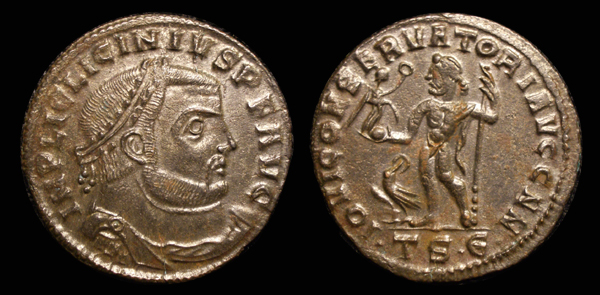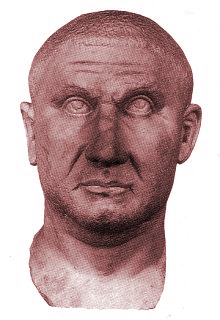
AE Follis - IMP LICINIUS I
(RIC VII 60E)
- Thessalonica Mint
Gaius Valerius Licinianus Licinius
Born: 263 (est)
Emperor: A.D. 308-324
Obverse: Portrait laureate, draped, cuirassed bust right - IMP LIC LICINIVS PF AVG
Reverse: Jupiter standing head left holding victory on globe and scepter, eagle at foot with wreath in beak - IOVI CONSERVATORI AVGG - dot TS dot E dot
|
Inscriptions: IMP(erator) LIC(inianus) LICINIVS P(ius) F(elix) AVG(ustus) / IOVI (Jupiter) CONSERVATORI (Preserver) AVG(ustus) G (Two emperors) TSE (Thessalonica Mint) Emperor Licinianus Licinius Dutiful Augustus / Jupiter the Preserves the Two Emperors - Minted in Thessalonica Of humble origins Licinius accompanied his close friend the Emperor Galerius on the Persian expedition in 297. After the death of Flavius Valerius Severus, Galerius elevated Licinius to the rank of Augustus in the West in 308. He received as his immediate command the provinces of Illyricum, Thrace and Pannonia. On the death of Galerius, in May 311, Licinius shared the entire empire with Maximinus Daia, the Hellespont and the Bosporus being the dividing line. In March 313 he married Flavia Julia Constantia, half-sister of Constantine, at Mediolanum (now Milan), the occasion for the jointly-issued "Edict of Milan" that restored confiscated properties to Christian congregations. Though it did not "Christianize" the Empire as is often assumed, it did give Christians a better status in Rome. In the following month (April 30), Licinius inflicted a decisive defeat on Maximinus at the Battle of Tzirallum, after Maximinus had tried to attack him. He then established himself master of the East, while his brother-in-law, Constantine, was supreme in the West. In 314 he committed a jealous treason in favor of Bassianus against Constantine. When his actions became known, a civil war ensued, in which Constantine prevailed at the battle of Cibalae in Pannonia and he later defeated Licinius again two years later in the plain of Mardia in Thrace. Reconciliation left Licinius in possession of Thrace, Asia Minor, Syria and Egypt, but he later added numerous provinces to Constantine's control. In 324 Constantine, tempted by the "advanced age and unpopular vices" of his colleague, again declared war against him and, having defeated his army at the battle of Adrianople, succeeded in shutting him up within the walls of Byzantium. He was defeated, captured, and interned at Thessalonica. When he attempted to raise troops among the barbarians Constantine had him and his former co-emperor Martinianus assassinated, undermining a promise the emperor made half a year prior. |

